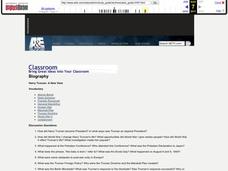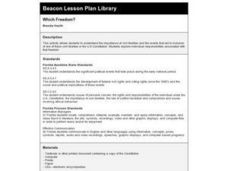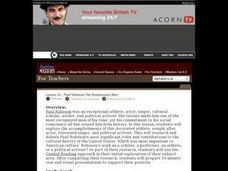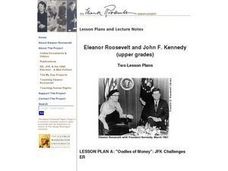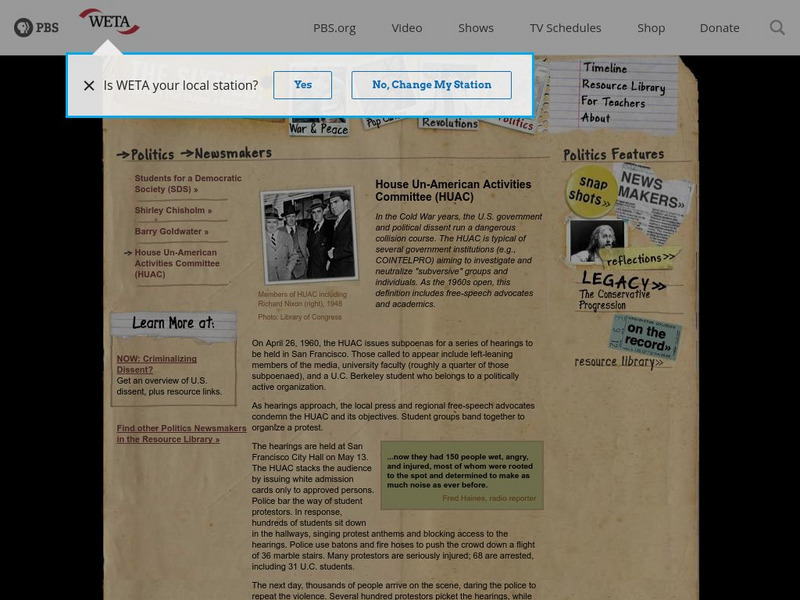Curated OER
The Impact of the Dust Bowl as Shown Through Photography
Seventh graders examine and discuss photographs and paintings of the Dust Bowl era. They write a journal entry describing what it would be like if they stepped into one of the photographs, and create a Powerpoint presentation on the Dust...
Curated OER
Coney Island
Students compare the Coney Island of today to the Coney Island of 100 years ago. While discussing the features of Coney Island, students brainstorm their associations of the area. Through observing several pictures of Coney Island,...
Curated OER
Court Documents Related to
Students use the National Archives to researcj cout coduments related to Martin Luther King, Jr.
Curated OER
Harry Truman: A New View
Students explore how Harry Truman became President and in what ways was Truman an atypical President. They examined World War I changed Truman's life and what opportunities World War I gave certain people and how World War II affected...
Curated OER
Federal Holidays
Students learn the history and why each Federal holiday is celebrated. Students identify how the celebration of each holiday ties the nation together.
Curated OER
Tulips: Predicting the Arrival of Spring
Learners use the blooming of tulips as a tool to measure spring's journey north. They predict when tulips bloom at 13 selected Journey North gardens in various geographic regions.
Curated OER
Which Freedom?
Fourth graders choose on the freedoms in the Bill of Rights and research it on the internet. They answer specific questions using their research and produce a written document using a computer.
Curated OER
New York City: Passionate About Shakespeare
Students read passages from Shakespeare and have a Town Hall meeting in which they defend Shakespeare as part of American culture.
Curated OER
Paul Robeson: The Renaissance Man
Students research the life of athlete, actor, singer, cultural scholar, author, and political activist, Paul Robeson. They answer the question, "Which was most important to American culture -Robeson's work as a scholar, a performer, an...
Curated OER
Apartheid and Segregation
Students view a television program that depicts the history South African Apartheid and the United States' system of segregation. They discuss how laws were used to uphold these institutions and compare and contrast racism and...
Curated OER
If We Knew Then What We Know Now -- Cuban Missile Crisis (Background)
Students examine the background of the Cuban Missile Crisis. Using the foreign policy decision-making process, they simulate and elaborate the processe involved. They identify the causes of the misconceptions that plagued the U.S.-Cuba...
Curated OER
The Role of Television in Social Justice
Pupils will read and evaluate another student's culminating project rough draft. Students will make written comments on the evaluation sheet provided by the teacher with regard to relevance to topic of Media and Social Justice, grammar,...
Curated OER
The Role of Television in Social Justice
Students will discover the direct impact television coverage had on the African American Civil Rights Movement. They will employ listening, information processing, and critical thinking skills while watching the film clips and answering...
Curated OER
Eleanor Roosevelt and John F. Kennedy
Students discuss the election of 1960. They examine the political styles of important leaders, the issue of money, and the issue of fair play in American politics. Students explore the lives of Eleanor Roosevelt and John F. Kennedy.
Curated OER
Virginian Contributors
Students examine the contributions of native Virginians to the United States. For each person, they read excerpts of a book about their contributions and organize the information in a chart. In groups, they become an expert on one of...
Curated OER
Breaking News English: Civil Rights Icon Rosa Parks Dies
In this English learning exercise, students read "Civil Rights Icon Rosa Parks Dies," and then respond to 47 fill in the blank, 7 short answer, 20 matching, and 8 true or false questions about the selection.
Curated OER
Dollar Value and Fast-Food Nutrition
Students examine how they can make changes to form healthy eating habits. In this investigative lesson students examine food guidelines and the food pyramid.
Gilder Lehrman Institute of American History
Gilder Lehrman Institute: History Now: Anti Communism in the 1950s
[Free Registration/Login Required] An essay tracing the anti-Communist hysteria beginning in earnest at the end of World War II that resulted in Truman's federal Loyalty Security program and ending with McCarthyism in the 1950s.
Digital Public Library of America
Dpla: Activism in the Us
American sociopolitical activism became especially prominent during the period of societal upheaval which began during the 1950s. The African American civil rights movement led the way, soon followed by a substantial anti-war movement...
PBS
Pbs Learning Media: Activism in the Civil Rights Movement
In this interactive lesson, students will learn about the historical background of racial segregation and the brave individuals and groups who stood up against segregation during the 1950s and 1960s.
Calisphere: University of California Libraries
University of California: Calisphere: 1950s 1970s: The Free Speech Movement
Explore these primary resources to learn about the free speech movement, particularly in California, determine who the leaders were, where the center of activity was, and what the message was that students were trying to convey.
Khan Academy
Khan Academy: Anticommunism in the 1950s
Looks at the paranoia of the 1950s when Americans lived in fear of communism. The House Committee on Un-American Activities created blacklists of people working in Hollywood, McCarthyism flourished, and the Rosenberg couple were tried...
George Washington University
Eleanor Roosevelt Papers Project: House Un American Activities Committee
A description of the genesis of the House Un-American Activities Committee and the bullying inquisition of those the committee accused of having Communist leanings.
PBS
The Sixties: House Un American Activities Committee
The House Un-American Activities Committee gained noteriety in the 1950s with Joseph McCarthy and his witch hunts. The committee was still in existence in the early 1960s. Read this brief article to see what it was investigating then.





